Watching your sneaky cat inch towards your morning brew, you’ve probably wondered if cats can drink tea, coffee, or other morning musts with caffeine.
The answer is complicated when it comes to sharing tea with cats, but one thing’s for sure: coffee and felines should never mix. Chock full of caffeine and other stimulants, cats should never drink coffee as caffeine is toxic to cats. This includes decaffeinated coffee since the beans also contain theobromine, another stimulant that can sicken felines.
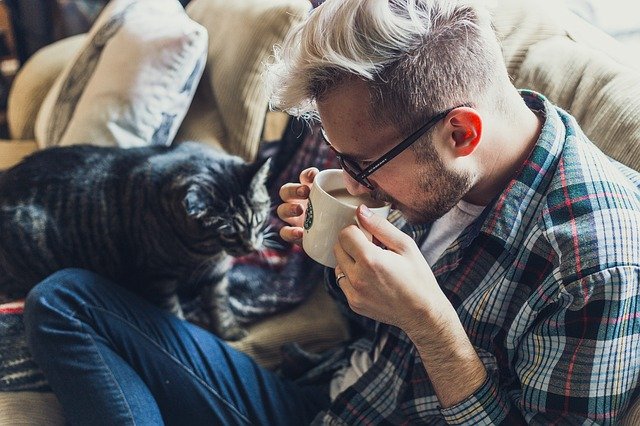
In protecting your cat from caffeine, don’t let her drink caffeinated sodas or energy drinks either. Also look out for guarana, mate, and cacao when checking food labels. All three are natural sources of caffeine. Also, according to the Pet Poison Helpline, caffeine may go by the alternate names methylxanthine and xanthine.
Did you know you can also find caffeine in diet supplements, weight loss products, and over-the-counter medications?
If your cat manages to steal a sip though, don’t panic, as the Helpline reports, “One or two licks of coffee, tea, or soda is unlikely to cause poisoning in most pets.”
Though a sip most likely won’t harm your cat, it should be remembered that cats are much smaller than humans. So, the idea of a little bit for a feline vastly differs from a small amount for humans. While anything more than those couple of licks has the potential to make your kitty sick, Dr. Sarah Wooten, a small animal veterinarian practicing in Colorado, explained to Dodo Well, for most cats, “In general, the average cat (about 8 pounds) would need to consume about 80 milligrams of caffeine to develop toxicity, which amounts to about 10 milligrams per pound of body weight.”
Dodo Well also reports black tea contains around 50mg of caffeine per cup and though that’s reportedly less than what can harm the average cat, you should still keep your cat out of the teacup. One should remember that no matter how much caffeine a cat consumes, every feline is different, as are their reactions to things. Size, age, and health can all affect how a cat reacts to caffeine.
Even if your cat only steals a couple of sips, you should still keep an eye out for any of these symptoms of caffeine toxicity in cats:
- Hyperactivity
- Restlessness
- Agitation
- Heavy or excessive panting
- Drooling
- Vomiting or diarrhea
- Shakiness or tremors; seizures can occur in extreme cases
- Increased heart rate
- Elevated body temperature
- Raised blood pressure
- Unconsciousness
- Signs of caffeine poisoning in cats will appear within 30 – 60 minutes of ingestion.
Call the vet if any of these symptoms appear. If you suspect your cat has consumed a caffeinated beverage and you are unsure of the amount, call the vet right away and ask how to proceed. The doctor may recommend inducing vomiting to void the toxins from your cat’s belly, but don’t try to do this without the guidance of a feline medical expert! Most likely, the vet will have you bring your cat to the office, where they will induce vomiting safely.
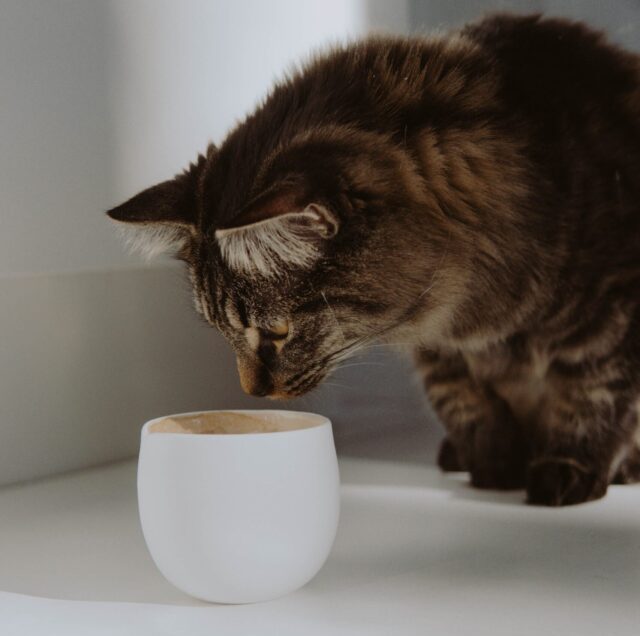
Beyond the cups of coffee or tea, be sure your cat doesn’t have access to the preparation area or the storage areas, as the Pet Poison Helpline also states, “Ingestion of unused coffee grounds or beans, tea bags, or supplements could cause serious toxicity in dogs or cats.”
Soft Drinks without Caffeine
In mentioning caffeinated beverages, soft drinks and their syrupy deliciousness should definitely be included in the conversation as many carbonated beverages contain caffeine. Those are definitely a no-no, but even the fizzy drinks without caffeine should be kept out of cat paws. With high sugar levels and sodium enough to be concerning, they’re just a bad idea for felines. Regarding diet and zero sugar soft drinks, make sure your kitty avoids those too. They’re filled with artificial sweeteners and chemicals that can be harmful to cats.
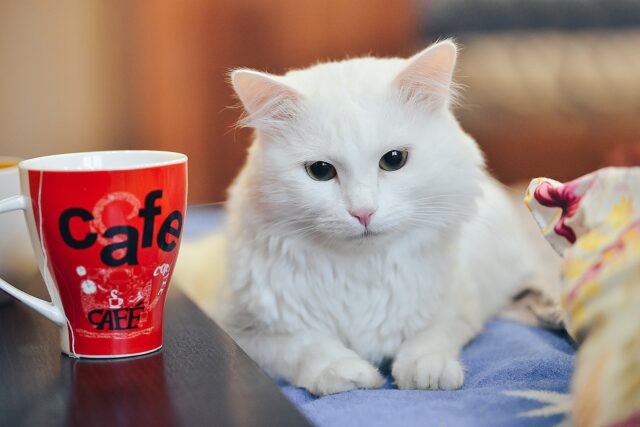
Fun fact: Studies indicate cats have a diminished ability to taste the sweet in foods as their tastebuds aren’t genetically coded to crave sweet-tasting carbohydrates. So, why do they want a sugary drink then? The answer is simple. Because they’re cats and they think everything, including your drink, belongs to them!
Want to know more about your cat’s sense of taste? Check out the science behind Why Your Cat Is A Finicky Eater.
Why Do Cats Try to Drink Tea and Coffee?
So, if tea and coffee with caffeine are toxic to felines, why are they drawn to them?
Outside of the natural feline proclivities for investigation, coffee can attract cats because of the delicious dairy fat aroma of creamers. When it comes to tea, many different herbal tea blends can smell enticing to cats. Kitties tend to enjoy the taste of the green outdoors and tea is simply steeped dried leaves or fruits that carry the scent of all things wild. Some cats just can’t resist, especially if your choice of herbal tea has a scent similar to catnip. If your herbal blend actually contains catnip, well, of course, you’ll be fighting kitty for control of the cup.
Before you let the cat take a sip of your decaffeinated herbal tea though, there are some things to be aware of.
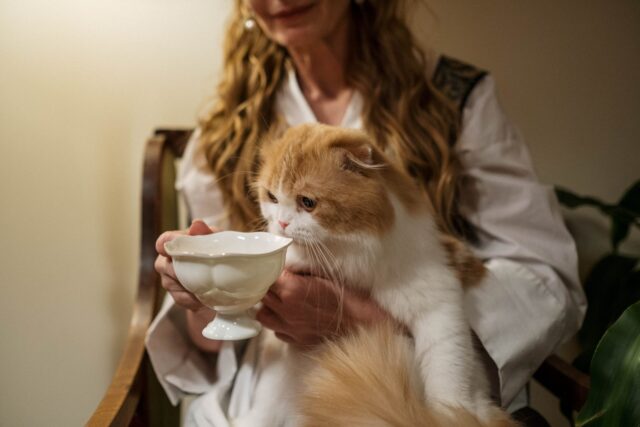
Cats Drinking Tea, A Complicated Subject
When researching whether or not cats can drink noncaffeinated herbal tea, one comes upon opinions divided. There are some that tout the beneficial effects of herbal tea for cats, while others maintain that tea in any form can be bad for cats.
Let’s have a look at both sides, so you can decide what feels right for your cat.
On the positive side of cats drinking tea, some herbs offer health benefits to cats and when brewed into warm tea, they can offer kitties a nice cup of comfort. Plus, anything you do with your cat, even if it’s sipping tea together, is an exercise in bonding for you and the fur baby. It’s always great to get closer with your cat and a chat over a cup of tea can do wonders for you both!
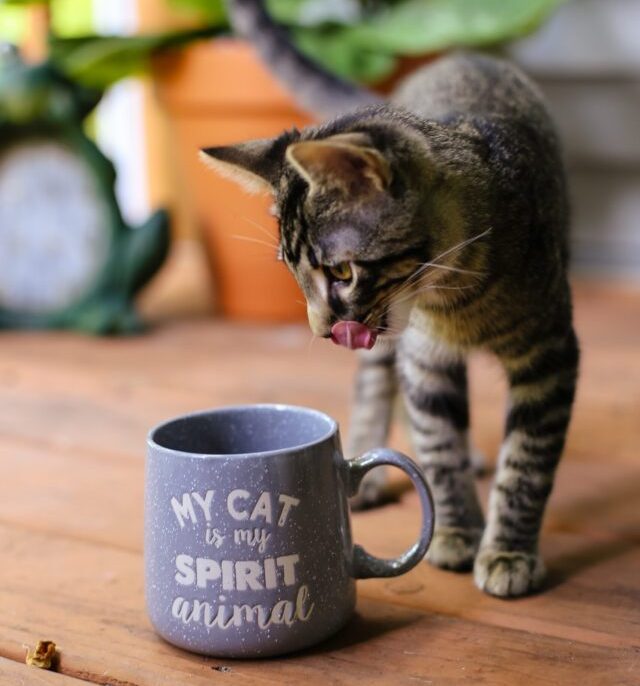
So, other than caffeine, what’s the downside of cats drinking tea?
The most common types of traditional tea are white, black, green, oolong, and pu’er, all of them made from the Camellia sinensis shrub. These “true teas,” as FreshTea.com labels them, are the basis of the world’s most popular teas, like Darjeeling, English Breakfast, Chai, and Earl Grey. And each of these “true teas” contains caffeine, making them automatically not safe for cats. But, wait. There’s one exception among these; according to VCA Hospitals, green tea has been determined safe for cat consumption, even finding its way into animal supplements as green tea offers anti-inflammation properties. Still, when it comes to letting cats drink green tea, stick to vet-prescribed supplements and keep kitty out of your cup, as the “true teas” contain tannins.
What are Tannins?
Healthline defines tannins as, “A type of plant compound naturally found in foods and beverages, including tea, coffee, chocolate, and wine. They’re well known for their astringent, bitter flavors and ability to easily bind with proteins and minerals.”
And tannins can be harmful to cats, meaning even decaffeinated traditional teas also have the potential to sicken felines. Other than vet-recommended doses of green tea, it’s best to avoid letting your cat drink any of the traditional or “true” teas.
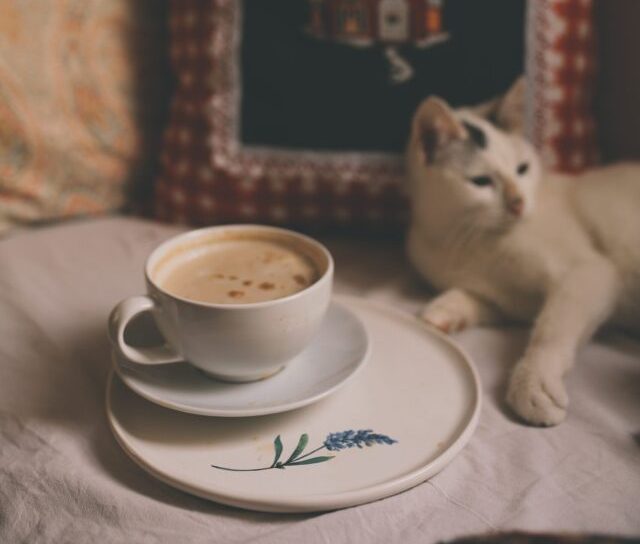
Did you know black tea is the most popular tea in the U.S., often used in restaurants to make sweet tea? Of the traditional teas, black tea contains the highest levels of caffeine and tannins. Do not let your cat drink sweet tea from restaurants or those bottled by manufacturers as these will most likely be brewed from black tea. Caffeine, tannins, and sugar are all bad for cats.
But what about herbal teas and cats?
Can Cats Drink Herbal Tea?
There are those who feel cats should avoid herbal teas altogether, but with proper guidance from your vet and careful research, your cat can safely enjoy a sip or two of certain herbal teas. Just be sure your herbal tea blend doesn’t contain any of the caffeinated traditional teas or other toxic ingredients.
Beyond the comfort found in a warm mug of herbal tea, some herbs offer cats great health benefits, with Dr. Wooten sharing, “diluted, cooled herbal teas are great for cats, if they like them!”
So, which herbal teas can you drink with your cat?
For a purrfect tea time for two, Dr. Wooten says you and your cat can share, “chamomile, echinacea, calendula, valerian (dilute and low dose), licorice root, dandelion root tea and the appropriately named cat’s claw tea.”
What benefits do cats draw from drinking herbal tea?
For inflammation and boosting the immune system, cats can sip chamomile, echinacea, calendula, licorice root, and dandelion. Plus, these options “help cats with itchy skin.”
If you’re looking to calm your cat, try “catnip, chamomile and valerian all provide calming benefits.”
Ah, chamomile! The ultimate comfort tea, you and your cat can drink chamomile tea together for a moment of coziness on the couch. But if you want to throw the ultimate tea party for your cat, brew up a cup of catnip tea. Kitty would love a warm mug of catnip infused into fresh water or broth. Not only will it up feline hydration levels, but this tea also offers cats the euphoria of catnip in a soothing beverage.
Does your cat drink from the faucet? Check out these 6 Reasons Cats Drink From The Faucet & Shower to figure out why.
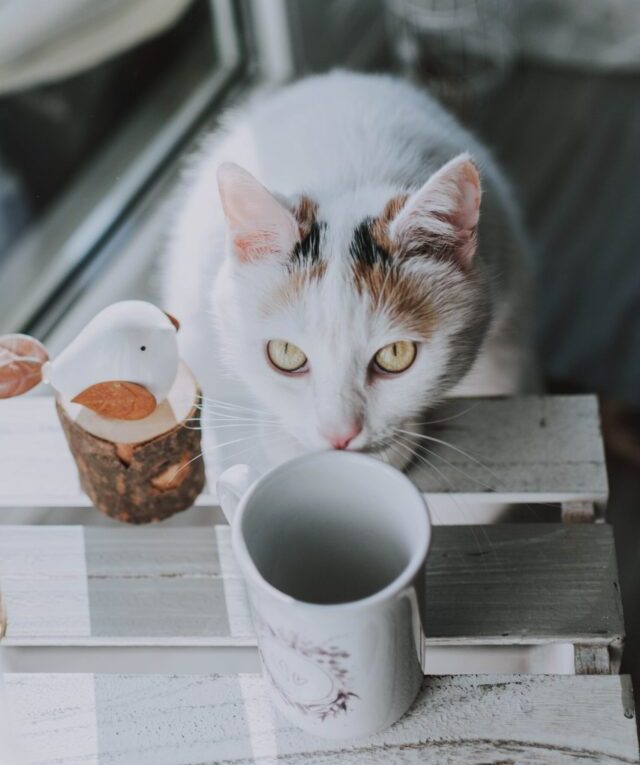
Catnip Tea Recipe for Cats
As an occasional treat, throw a kit-tea party for your cat featuring catnip tea! Check out this recipe from Food.com.
Ingredients
- 1 cup warm water
- ¼ cup low sodium chicken broth or bullion
- 3 tablespoons of fresh or dried catnip
Preparation
- Place the warm water in a container with a tight-fitting lid.
- Add the catnip. Here, you can choose to place catnip in tea ball to keep the mix just liquid or throw the loose herbs in the water for a gritty tea.
- Next, add chicken broth or bullion and tightly seal.
- Shake vigorously for a couple of minutes allowing bullion to dissolve or until the catnip has given the water and broth a greenish tinge.
- Serve ¼ cup of tea to your cat in a shallow bowl.
- Store the remainder in the refrigerator. Warm before serving.
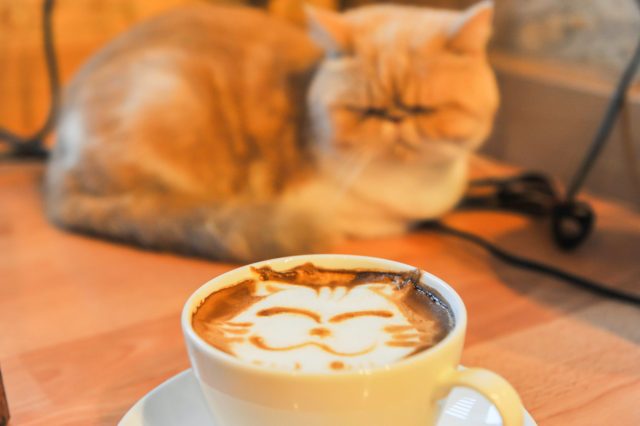
Some tips to remember when making not just catnip tea, but any cat-friendly herbal teas:
- Keep the brew weak by steeping tea for half the amount of time of human consumption.
- Don’t offer a whole cup of tea at once. A small saucer with a few licks is all your kitty needs.
- Always check your herbal tea blends for caffeine or other cat-toxic ingredients.
- Watch for adverse reactions, like upset tummies, and discontinue if any occur.
Again, the decision to drink tea with your cat is one that depends on your family. If you decide to try a cat-safe tea, do your research and talk with your cat’s veterinary staff regarding their thoughts and concerns about cats and tea.
Happy sipping to you and your feline best friend! Looking for other ways to have fun with your cat? Here are 11 Fun Ways To Keep Your Cat Entertained.
